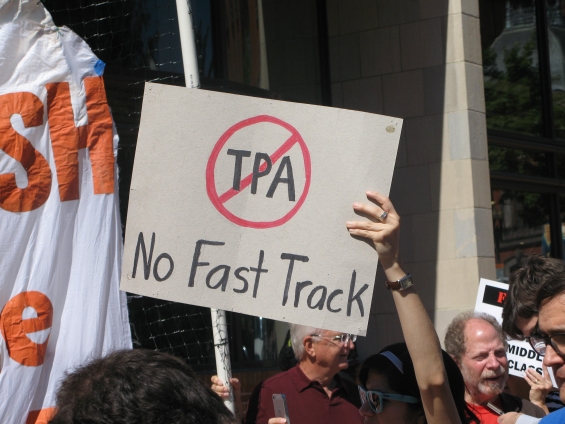US trade debate prompts fears of delay in talks

Financial Times | January 20, 2014
US trade debate prompts fears of delay in talks
By Shawn Donnan in London
A heated debate over trade in the US Congress risks stalling two trade negotiations that cover 70 per cent of the global economy, senior international officials have warned.
For President Barack Obama the key to sealing both the Trans-Pacific Partnership and a deal with the EU is securing so-called fast-track authority. It gives the White House power to negotiate trade deals and limits Congress’s ability to intervene in nitty-gritty details once talks are concluded.
If Mr Obama fails, it would scupper his ambitious second-term trade agenda. He has already hit stumbling blocks as he missed his self-imposed aim to reach a preliminary agreement with TPP members by the end of 2013. It would also threaten US-led efforts in Geneva to update the rules for the $4tn annual trade in services around the world.
After months of haggling, Congressional leaders this month introduced a bipartisan bill to grant Mr Obama what is formally known as Trade Promotion Authority (TPA). But it is already facing opposition from many Democrats and criticism from Republicans who want Mr Obama to do more to bring his own party into line.
In an interview with the Financial Times, Ildefonso Guajardo Villarreal, Mexico’s economy minister, said governments in the TPP talks, in which it is a member, were unlikely to offer any significant concessions until they were sure Mr Obama had fast-track authority and any agreement could get through the US Congress.
“We have to wait until we really get a better sense of how things evolve. From a negotiating point of view . . . things will go along slowly until that happens,” Mr Guajardo Villarreal said, adding he believed the Obama administration would eventually secure fast-track authority. “If they are able to send a strong signal of support from Congress that will make it easier for us to finish the deal.”
The TPP negotiations are further along than the EU talks so the immediate impact is likely to be greater on those talks. But a senior European official said officials in Brussels were bracing for a TPA debate that could last through this year and would inevitably affect negotiations. “Without TPA we will always feel very reticent to show our real red lines,” the official said.
Administration officials remain confident that they can get the bill through Congress and Michael Froman, the US trade representative, said there was no reason for the fast-track debate in Washington to affect the progress of any trade negotiations.
“Every TPP partner has domestic politics, from elections to legislative battles over various policies that could impact the agreement,” he said. “We trust our partners to manage their own domestic processes, and we will be working with our Congress to pass broadly supported trade promotion authority here. In the meantime, there is no reason talks should slow.”
The bill is raising concern among negotiating partners. It would require the administration to include mechanisms to address currency manipulation in agreements, a sore point for TPP partner Japan. It also would require any deal the US enters to have strict, environmental, labour and intellectual property rules.
EU officials are concerned about a section of the bill which would give some members of Congress the right to attend negotiations. The concern in Brussels is that it could cause the European parliament to request the same access and thus add a political element to the complex negotiations.
Deborah Elms, an American TPP expert at Singapore’s S. Rajaratnam School of International Studies, said the concerns of other TPP countries over the conditions in the bill, particularly on currency, should not be underestimated.
But, above all, she said, President Obama needed to send a signal in this month’s State of the Union address that he was prepared to push for fast-track authority.
“You have two big negotiations that are a bit stuck waiting for Congress to move,” she said. “This is the time [to spend political capital]. Your whole trade agenda is stuck unless you get [fast-track authority] very soon.”
TPP negotiations in Singapore stalled last month over the failure of the US and Japan, the two biggest economies in the TPP talks, to agree on market opening measures on agricultural and other products. A plan by TPP ministers to meet as a group on the sidelines of this week’s World Economic Forum in Davos has been abandoned and ministers are now expected to next meet for negotiations in Singapore on February 22.
Japan and the US are expected to meet at Davos. “Unless Japan and the United States make certain progress within January, it will be difficult to finalise the whole [TPP negotiations],” Akira Amari, the Japanese minister leading the TPP talks, told reporters in Tokyo last week.
In an interview in London, Ryosei Tanaka, Japan’s vice minister for the economy and trade, said: “Each country has their own political difficulties to overcome but all in all the extent of the negotiations have come a long way. We just have to persevere and put all of our efforts into concluding the negotiations.”





